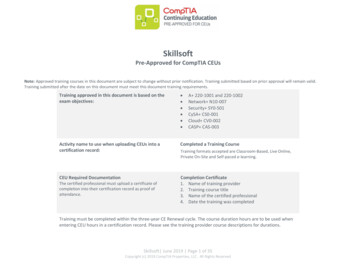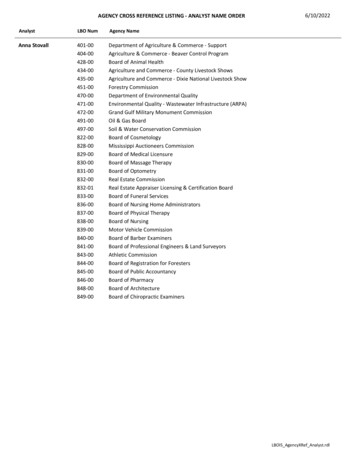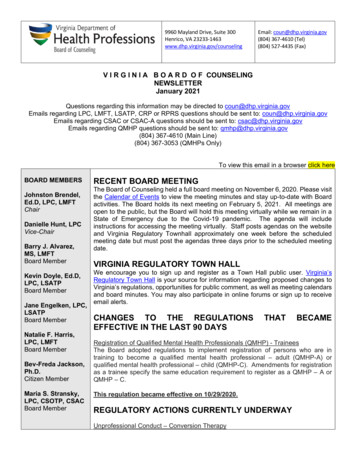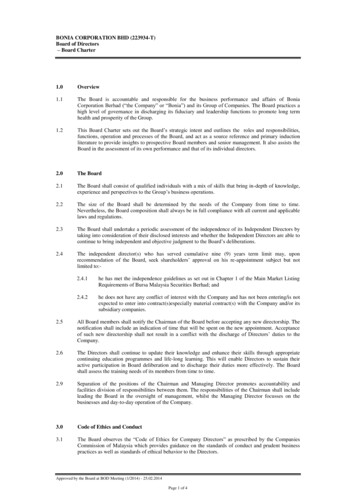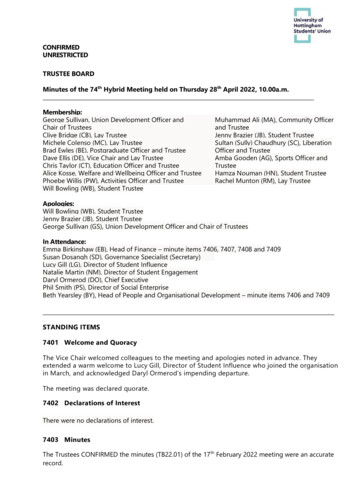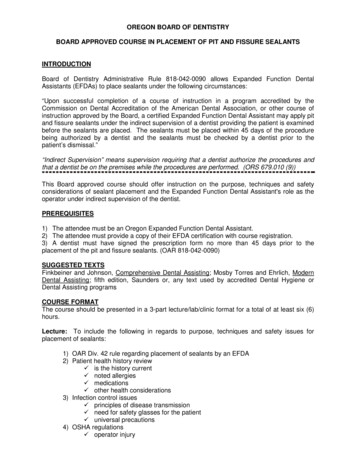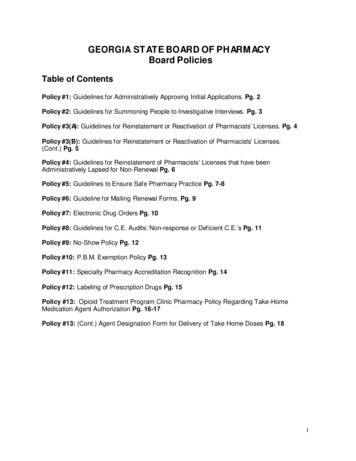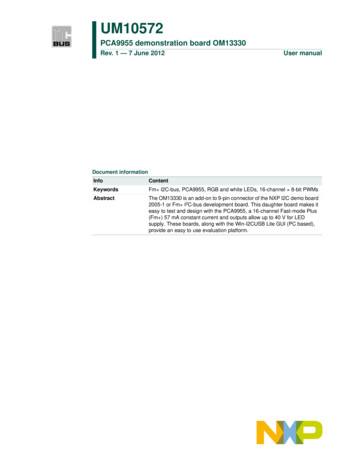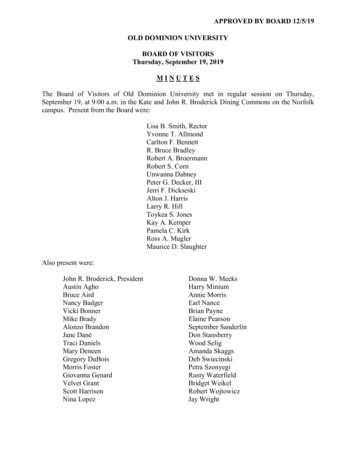
Transcription
APPROVED BY BOARD 12/5/19OLD DOMINION UNIVERSITYBOARD OF VISITORSThursday, September 19, 2019MINUTESThe Board of Visitors of Old Dominion University met in regular session on Thursday,September 19, at 9:00 a.m. in the Kate and John R. Broderick Dining Commons on the Norfolkcampus. Present from the Board were:Lisa B. Smith, RectorYvonne T. AllmondCarlton F. BennettR. Bruce BradleyRobert A. BroermannRobert S. CornUnwanna DabneyPeter G. Decker, IIIJerri F. DickseskiAlton J. HarrisLarry R. HillToykea S. JonesKay A. KemperPamela C. KirkRoss A. MuglerMaurice D. SlaughterAlso present were:John R. Broderick, PresidentAustin AghoBruce AirdNancy BadgerVicki BonnerMike BradyAlonzo BrandonJane DanéTraci DanielsMary DeneenGregory DuBoisMorris FosterGiovanna GenardVelvet GrantScott HarrisonNina LopezDonna W. MeeksHarry MiniumAnnie MorrisEarl NanceBrian PayneElaine PearsonSeptember SanderlinDon StansberryWood SeligAmanda SkaggsDeb SwiecinskiPetra SzonyegiRusty WaterfieldBridget WeikelRobert WojtowiczJay Wright
CALL TO ORDER AND STUDENT WELLNESS PRESENTATIONRector Smith called the meeting to order at 9:04 a.m. and welcomed new Board members RobertBroermann and Peter Decker. Introductions were made around the table.Don Stansberry, Interim Vice President for Student Engagement and Enrollment Services,briefed the Board on student wellness issues and the programs and services offered at theUniversity to assist students who are dealing with these ever-increasing issues. He sharednational statistics and comparative data at ODU. The Monarch Wellness initiatives promotewellness programs, resources and services dealings with dimensions of wellness including social,emotional, physical, financial, occupational, environmental, cultural, spiritual and intellectual.He shared a resiliency initiative, “Monarchs Bounce Back,” and other planned services, andexamples of how faculty and staff can help. The new Student Health & Wellness Center, anaddition to the Student Recreation Center, will house Student Health Services and CounselingServices and construction should begin in fall 2020 for completion by late 2021 or early 2022.In response to questions by Board members, Nancy Badger, Director of Counseling Services,noted that 4.5% of the student body is served by the Counseling Center, which is average for aninstitution of this size, and 17.5% of those are freshmen. Though understaffed compared withnational data, a staff psychologist has been added and doctoral students are being trained toaddress staff shortages. Ten sessions are offered to students and community resources areutilized as well.Vice President Stansberry said that the University emphasizes essential student care and providesother non-essential services as financial resources allow. Fees are charged for services such asmassage therapy, but at a reduced rate than outside the University. The Office of EducationalAccessibility assists students with mental health issues and assists in raising awareness of thefaculty. In a situation where a student may harm themselves or others, policy are notified andcounseling staff are on call 24/7. Referrals are made to the Community Services Board and inextreme situations the student may be detained and escorted off campus.The Board recessed for meetings of the standing committees.RECONVENE AND APPROVAL OF MINUTESThe Rector reconvened the meeting at 1:40 p.m. and called for approval of the minutes of themeeting held on June 13, 2019. Upon a motion made by Mr. Bennett and seconded by Mr. Hill,the minutes were unanimously approved by all members present and voting (Allmond, Bennett,Bradley, Broermann,, Corn, Dabney, Decker, Dickseski, Harris, Hill, Jones, Kemper, Kirk,Mugler, Slaughter).RECTOR’S REPORTThe Rector noted the various events she had attended recently that showcased the University.She congratulated President Broderick on his outstanding State of the University Address, and2
recognized Andy Casiello and his staff for their presentation to board members of the OnlineVirginia Network Board of Directors and the representative from Amazon who attended theirmeeting last week. She also attended the signing of the Mobility Pass agreement between ODUand the community colleges. She said it is exciting to witness all of the University’saccomplishments.PRESIDENT’S REPORTIn his report to the Board, President Broderick said that the University’s Six-year Academic andFinancial Plan was submitted to SCHEV and presented to the Op Six on July 24, and theadministration is now responding to the feedback it received. The Board is required to approvethe University’s six-year plan, to wit, a motion was made by Mr. Mugler and seconded by Mr.Harris to approve the plan as submitted. The following plan was unanimously approved by allmembers present and voting (Allmond, Bennett, Bradley, Broermann,, Corn, Dabney, Decker,Dickseski, Harris, Hill, Jones, Kemper, Kirk, Mugler, Slaughter).2020-2026 SIX-YEAR ACADEMIC AND FINANCIAL PLANStrategy1. Student Success and Job Readiness2. Teaching and Research Faculty Salary Increase3. Need-Based Student Financial Assistance4. Hampton Roads STEM Pipeline (Digital Innovation Academy)5. Transfer Pathways and Degree Completion6. School of Public Health7. Social Mobility Center8. Operations and Maintenance of New Chemistry Building9. Administrative and Professional Faculty Salary Increase10. Classified Staff salary Increase11. Virginia Institute for Spaceflight and Autonomy (VISA)12. Offshore Wind Energy/Innovative PortsTOTALFY2021 2.7M 3.1M 6.9M 12.3M 2.0M 2.5M 650K 970K 1.2M 1.8M 857K 267K 35.2MFY2022 2.7M 6.2M 13.8M 7.3M 2.0M 2.5M 650K 1.3M 2.4M 3.6M 1.0M 273K 43.8MMeetings were held with the Governor (September 14) and the Governor’s Cabinet (September16) to discuss these budget priorities. A campus visit by the Department of Planning Budget isbeing scheduled. The decision package budget requests are due on September 20.The General Assembly passed HB2490 and SB1617 creating the Tech Talent Pipeline. TheUniversity submitted its Tech Talent Pipeline request in May and is awaiting the decision of theOp Six and the Virginia Department of Economic Development. The General Assembly alsopassed HB2653 and SB1628 creating Individual Performance Pilot Agreements for technologyrelated programs. ODU filed its Intent to Submit on April 1 and submitted its full proposal thispast spring. The Op Six has not yet met to discuss IPPAs.Boards of Visitors are now required to establish policies for public comment prior to voting onincreases to undergraduate tuition and mandatory fees. A policy is being drafted by Donna3
Meeks and others and will be brought to the Board for approval in December. The Six-Year Planrequired tuition scenarios for the first time. There is strong support from the current Houseleadership for another tuition moderation fund. The Governor’s Office has not yet responded.President Broderick provided an update on the following campus initiatives:Online Virginia Network (OVN): ODU hosted recent OVN Board meeting Five community colleges have joined the partnership with ODU and GMU Budget was approved to provide 3M for OVN partners Institutions are providing in-kind resources to complement outreach, student support andcourse creation; ODU provides 2.5M per year Meeting outcomes include Amazon Web Services (AWS) connecting with ODU oninfrastructure offering cloud computing and will engage to provide comprehensive cloudcompetencies in academic programs to optimize the Commonwealth’s workforceThe Mobility Pass Agreement between ODU, Tidewater Community College, Thomas Nelson CommunityCollege, Paul D. Campus Community College, and Eastern Shore Community College Students not admitted to ODU but who appear to have the potential to succeed will bereferred to their local community college to participate in the program Students who earn at least a 2.5 GPA in their first 16 hours will be guaranteed admission toODU Reverse transfer process will be used to transfer ODU coursework back to the communitycollege to help participants receive an Associate’s degree and to meet general educationrequirements more quickly ODU will assist participants on securing housing near ODU if they wish and will have accessto ODU transportation to get from ODU to TCC campusesChartway Arena ODU and Chartway Federal Credit Union recently signed a ten-year branding andsponsorship agreement for the arena in the Ted Constant Convocation Center The interior of the Ted is now named Chartway Arena in recognition of the 4.25 millioncontract The agreement made Chartway the official credit union of ODU Athletics The sponsorship establishes the Chartway-Constant Athletic Scholarship Fund that willaward a total of 25,000 in scholarships annually to student-athletesMinors on Campus Policy New policy defines who is a considered a minor on campus (current students excluded) Policy applies to all youth programs The Office of Risk Management manages the program Kudos to Chief Rhonda Harris and Rob Wells, Director of Risk ManagementPresident Broderick invited Board members to submit nominations for honorary degree awards.These awards are intended to recognize outstanding contributions to society through scholarship,4
artistic production, or humanitarianism. Nominations should be sent to Donna Meeks. He alsodistributed a list of new statutes that impact ODU.President Broderick said that while we have a record freshman class and came close to hittingtransfer student projections, we haven’t gained any ground on retention and graduate enrollment,so we may have additional discussions on impact on revenue and we may need to redirectresources to those programs that produce the most revenue. An Enrollment Advisory Committeehas been formed to discuss enrollment and retention issues.President Broderick recognized Giovanna Genard and her team for the Telly Award received bythe University for the 30-second spot that was featured during the game with Virginia Tech andwill be shown during the UVa football game broadcast. The video was shown to the Board.REPORTS OF STANDING COMMITTEESAUDIT AND COMPLIANCE COMMITTEEThe Rector called on Ms. Dickseski for the report of the Audit and ComplianceCommittee. Ms. Dickseski reported that Mr. William Cole, the independent externalassessor engaged by the University, briefed the Committee on the external qualityassurance review of the University Audit Department. He reported that the departmentreceived a rating of GC, or Generally Conformed, which is the highest rating given.Ms. Amanda Skaggs, the University’s Chief Audit Executive, welcomed the newmembers of the Committee and reviewed the responsibilities of the Committee asoutlined in the Committee’s charter. She described the University Audit Department’squality assurance improvement program, noting that in addition to the full externalassessment done this year, a limited internal program was executed that covered annualacknowledgements of the Code of Ethics and department manual, a review of standardtemplates and programs and a review of the charter. She stressed the importance ofindependence and objectivity in the internal audit function, which must be confirmedannually.Ms. Skaggs presented proposed revisions to Board Policy 1610, Charter of the UniversityAudit Department to reflect the change of the Committee’s name and the reportingfrequency of open audit issues. The following resolution was brought forth as arecommendation of the Audit and Compliance Committee and was unanimouslyapproved by all members present and voting (Allmond, Bennett, Bradley, Broermann,,Corn, Dabney, Decker, Dickseski, Harris, Hill, Jones, Kemper, Kirk, Mugler, Slaughter).5
RESOLUTION TO APPROVE REVISIONS TO BOARD OF VISITORS POLICY 1610 –CHARTER OF THE UNIVERSITY AUDIT DEPARTMENTRESOLVED, that upon the recommendation of the Audit and Compliance Committee,the Board of Visitors approves the proposed revisions to Board of Visitors Policy 1610, Charterof the University Audit Department.NUMBER:1610TITLE:Charter of the University Audit DepartmentAPPROVED:November 14, 1981; Revised May 15, 1982; Revised April 5, 1990;Revised September 13, 2002; Revised June 17, 2010; Revised June 12,2014; Revised September 24, 2015; Revised September 21, 2017; RevisedSeptember 20, 2018Purpose and MissionThe purpose of Old Dominion University’s internal audit activity is to provide independent,objective assurance and consulting services designed to add value and improve the University’soperations. The mission of internal audit is to enhance and protect organizational value byproviding risk-based and objective assurance, advice and insight. The internal audit activity helpsthe University accomplish its objectives by bringing a systematic, disciplined approach toevaluate and improve the effectiveness of governance, risk management and control processes.This charter as adopted herein will serve as a guide for the activities of the University AuditDepartment at Old Dominion University. This charter does not include, nor is it intended toinclude, all of the department’s duties or responsibilities as they may exist from time to time.Objectives and Scope of Internal Audit ActivitiesThe scope of internal audit activities encompasses, but is not limited to, objective examination ofevidence for the purpose of providing independent assessments to the Audit and ComplianceCommittee and management on the adequacy and effectiveness of governance, risk managementand control processes for Old Dominion University.1. Evaluating financial and operating procedures for adequacy of internal controls andproviding advice and guidance on control aspects of new policies, systems, processes andprocedures;2. Ascertaining the extent of adherence, by the University and its employees, to establishedpolicies, plans, and procedures, and compliance with state and federal laws andregulations;6
3. Determining whether resources and assets are acquired economically, and protectedadequately;4. Determining the propriety and accuracy of financial transactions and data;5. Working with management to identify opportunities for process improvements, costsavings and revenue enhancements;6. Evaluating the accuracy, security, effectiveness and efficiency of the University’sinformation technology and processing systems;7. Evaluating the effectiveness and efficiency of operations and programs along withdetermining whether the results of operations or programs are consistent with establishedgoals and objectives;8. Assisting in the education and training of employees in University policies andprocedures, as well as the need for and characteristics of strong internal controls;9. Assisting management in the deterrence of fraud and investigating any instances of suchactivity discovered at the University; and10. Coordinating audit efforts with the Auditor of Public Accounts and other externalauditors.Standards for the Professional Practice of Internal AuditingThe Institute of Internal Auditors, Inc., an international organization dedicated solely to theadvancement of the internal auditing profession, has adopted "The International ProfessionalPractices Framework (IPPF)." The four mandatory elements of the IPPF are the core principlesfor the professional practice of internal auditing, definition of internal audit, Code of Ethics, andthe International Standards for the professional practice of internal auditing (Standards).The University Audit Department will govern itself by adherence to the mandatory elements ofthe Institute of Internal Auditors’ International Professional Practices Framework. The ChiefAudit Executive will periodically report to senior management and the Audit and ComplianceCommittee regarding the internal audit activity’s conformance to the Code of Ethics and theStandards.Reporting and ResponsibilitiesThe University Audit Department is functionally accountable and reports to the Board of Visitorsthrough the Audit and Compliance Committee. The Chief Audit Executive will meet with theAudit and Compliance Committee at each of the scheduled quarterly Board meetings.The Department reports administratively to the President’s Office and works with the Presidentor through a designated representative for the purpose of the day-to-day operations.7
The Chief Audit Executive shall have direct access to the President and to the Audit andCompliance Committee of the Board of Visitors in any instance where the Chief Audit Executivebelieves that such access is needed to fulfill the stated objectives of the department.The Chief Audit Executive shall periodically report to senior management and the Audit andCompliance Committee of the Board of Visitors regarding:1. The department’s purpose, authority and responsibility.2. Risk-based audit plan and performance relative to the plan along with any adjustmentsneeded to the plan.3. Conformance with the IIA’s Code of Ethics and Standards, and action plans to addressany significant conformity issues.4. Significant risk exposures and control issues to include fraud, governance issues andother matters requiring the attention of, or requested by, the Audit and ComplianceCommittee.5. Results of audit engagements and other activities.6. The propriety of any limitations on the scope of internal audits that may be imposed byUniversity management.7. Resource requirements.8. Any response to risk by management that may be unacceptable to the University.As used herein, the term "external" shall refer to representatives of or the activities of the Auditorof Public Accounts for the Commonwealth of Virginia, individual certified public accountants(the "CPA") and auditors from organizations, governmental or commercial, outside theUniversity.Code of Virginia §2.2-307 et seq., established the Office of the State Inspector General (OSIG)effective July 1, 2012, and charged the office with providing services in three core areas:(1) investigating complaints alleging fraud, waste, abuse, or corruption; (2) conductingperformance reviews of executive branch agencies; and (3) coordinating and requiring standardsfor internal audit programs existing as of July 1, 2012, and developing and maintaining otherinternal audit programs. As the OSIG is required to coordinate and require standards for thoseinternal audit programs, ODU’s University Audit Department will adhere to any OSIGdirectives.AuthorityThe Chief Audit Executive will have unrestricted access to, and communicate and interactdirectly with, the Audit and Compliance Committee, including private meetings withoutmanagement present.8
The Audit and Compliance Committee authorizes the internal audit activity to:Have full, free, and unrestricted access to all university activities, property, personnel, andrecords which are relevant to fulfillment of the department’s mission to the University. It is understood that certain items of the university are confidential in nature and specialarrangements will be made when examining and reporting upon such items. Allocate resources, set frequencies, select subjects, determine scope of work, applytechniques required to accomplish audit objectives, and issue reports. Obtain assistance from the necessary personnel of Old Dominion University, as well asother specialized services from within or outside of the University, in order to completethe engagement.Independence and ObjectivityThe University Audit Department shall be free from all conditions that threaten the ability ofinternal auditors to carry out their responsibilities in an unbiased manner, including matters ofaudit selection, scope, procedures, frequency, timing, and report content. The University AuditDepartment shall be free from control or undue influence in the determination of facts revealedby the examination or in the development of recommendations or opinions as a result of theexamination.If the Chief Audit Executive determines that independence or objectivity may be impaired in factor appearance, the details of impairment will be disclosed to the appropriate parties. The ChiefAudit Executive will disclose to the Audit and Compliance Committee any interference andrelated implications in determining the scope of internal auditing, performing work, and/orcommunicating results.Internal auditors will maintain an unbiased mental attitude that allows them to performengagements objectively and in such a manner that they believe in their work product, that noquality compromises are made, and that they do not subordinate their judgment on audit mattersto others. Internal auditors will have no direct operational responsibility or authority over any ofthe activities audited. Accordingly, internal auditors will not implement internal controls,develop procedures, install systems, prepare records, or engage in any other activity that mayimpair their judgment.System Planning and DevelopmentThe University Audit Department will participate, in an advisory capacity, in the planning,development, implementation, and modification of major computer-based and manual systems toensure that:1. Adequate controls are incorporated in the system;2. A thorough testing of the system is performed at appropriate stages;9
3. System documentation is complete and accurate; and4. The intended purpose and objective of the system implementation or modification hasbeen met.The internal auditor participating in such a review should ensure that the extent of participationdoes not affect independence, thus suggested audit trails or other controls will be transmittedthrough formal correspondence.Responsibility for the Detection of Errors or IrregularitiesThe staff of the University Audit Department have a professional responsibility to conductreviews with an attitude of professional skepticism, recognizing that the application of internalauditing procedures may produce evidential matter indicating the possibility of errors orirregularities.If the internal audit staff believe that an error or irregularity may exist in an area under review orin any other area of the university, the Chief Audit Executive shall be notified at once. The ChiefAudit Executive should consider the implications of such an error or irregularity and itsdisposition with the President and/or the President's designated representative. If the Chief AuditExecutive believes that both of the individuals are directly involved, then the disclosure ofpotential errors or irregularities should be made directly to the chairman of the Audit andCompliance Committee of the Board of Visitors.The University Audit Department cannot be solely responsible for the detection and preventionof all errors and irregularities which may occur within the university. This is a responsibilityshared by all members of the university management team.Coordination of External AuditorsThe Chief Audit Executive is responsible for coordinating the audit efforts of the UniversityAudit Department with those of the Auditor of Public Accounts for the Commonwealth ofVirginia and other external auditors that have business with the University. This coordination ofaudit efforts should be in the planning and definition of the scope of proposed audits so the workof auditing groups is complementary and will provide a comprehensive, cost-effective audit.Audit PlanEach year, a proposed detailed audit plan for the next fiscal year will be submitted to the Auditand Compliance Committee. Upon approval of the plan by the Committee, audits will beinitiated pursuant to the plan.A block of time will be set aside for unexpected audits, special request audits and consulting, andcases received from the Commonwealth's fraud, waste and abuse hotline. In excess of this, anyadditions to the plan will require written documentation as to the need for such additions withfinal approval for the request being made by the President and Committee.10
A copy of all approved revisions to the audit plan will be submitted to the President and theAudit and Compliance Committee.Audit ReportsAt the conclusion of each audit, the department or activity audited will be provided anopportunity to respond in writing to the findings, conclusions, and recommendations of theUniversity Audit Department. In addition, an exit conference will be held with the individual incharge of the department or activity under review. All findings, conclusions andrecommendations will be discussed and any differences of opinion settled or so noted. A formalaudit report will be prepared after the exit conference is held and draft report reviewed. Thisreport will contain a summary of the function of the department or area, the objective ofperforming the audit, the audit methods used, detailed explanations of any issues noted andrecommendations for improvements thereon. A section of the audit report will include thedepartment's response to the recommendations made by the University Audit Department.Audit reports will be discussed with the vice president responsible for the area under reviewprior to the issuance to the President. All final audit reports will be issued to the President, withcopies to the Vice President of the area audited and the department head. Executive summariesof all final audit reports will be presented to the members of the Audit and ComplianceCommittee. Final Audit Reports are also shared with the Office of the State Inspector General asrequired. Further distribution will be at the discretion of the Chief Audit Executive.The University Audit Department will conduct a follow-up review on issues noted within thefinal audit reports to determine whether recommendations have been considered and acted upon.A status of open audit issues will be provided to the Committee periodicallysemi-annually.Detection, Investigation and Reporting of FraudThe University Audit Department shall be notified in all cases where the discovery ofcircumstances suggests a reasonable possibility that assets have, or are thought to have, been lostthrough defalcation or other security breaches in the financial, operating or information systems.Upon such notifications, the Chief Audit Executive should ensure that the proper authoritieswithin the department and the University have been notified of the potential loss. The ChiefAudit Executive should work to ensure that the University promptly notifies other statedepartments as required under Section 30-138 of the Code of Virginia.The University Audit Department will perform sufficient tests to identify the weaknesses infinancial and operating procedures, both automated and manual, which permitted the loss andevaluate the impact the weaknesses have with respect to other activities of the institution. Inaddition, the University Audit Department will recommend improvements to correct theweaknesses and incorporate appropriate tests in future audits to disclose the existence of similarweaknesses in other areas of the institution.11
Consulting ActivitiesAs part of its mission, the University Audit Department will engage in evolving forms of valueadded services which are consistent with the broad definition of internal auditing. As such, theDepartment from time to time may be asked to perform a variety of non-standard audit services,such as advisory activities and consulting engagements, both of which may involve formal orinformal advice, analysis or assessment. These services will be provided at the discretion of theChief Audit Executive where they do not represent a conflict of interest or detract from theDepartment’s obligation to the Board of Visitors or the President.Decisions to adapt or implement recommendations as a result of consulting activities should bemade by management. It must be understood that consulting services cannot be rendered in amanner that masks information that, in the judgment of the Chief Audit Executive, should beprovided to the Board of Visitors and senior management. In the conduct of consulting activities,the Department will be guided by the IIA Code of Ethics and the Standards for the ProfessionalPractice of Internal Auditing.PersonnelThe ultimate quality of the University Audit Department's performance is directly related to thequality of the people employed. The internal audit function should be directed by and staffedwith qualified and competent individuals.Minimum qualifications for each position within the audit function have been established;however, additional experience, training, specialized skills, as well as intelligence, adaptability,promotability, an inquiring mind, analytical ability, good business judgment, and an ability tocommunicate with individuals should be considered in the employment process.The Chief Audit Executive should report annually to the Audit and Compliance Committee andthe President and/or a designated representative as to the effectiveness of the present staff infulfilling the stated objective of the University Audit Department.Continuing Professional DevelopmentThe university recognizes the need for internal auditors to enhance their knowledge and skillsand other competencies through continuing professional development.To fulfill this need, it is required that each representative of the department obtain at least forty(40) hours of continuing professional education credits annually, subject to funding availability.Quality Assurance and Improvement ProgramOld Dominion University recognizes the benefits to be derived from a quality assurance reviewof the internal audit function. The internal audit activity will maintain a quality assurance andimprovement programs that covers all aspects of the internal audit activity. The program willinclude an evaluation of the department’s conformance with the Standards and an evaluation of12
whether the internal auditors apply The IIA’s Code of Ethics. The program will also assess theefficiency and effectiveness of the department and identify opportunities for improvement.The Chief Audit Executive will communicate to senio
increases to undergraduate tuition and mandatory fees. A policy is being drafted by Donna . 4 . Meeks and others and will be brought to the Board for approval in December. The Six-Year Plan . Tidewater Community College, Thomas Nelson Community College, Paul D. Campus Community College, and Eastern Shore Community College .

